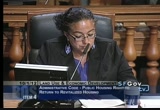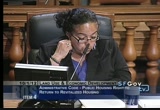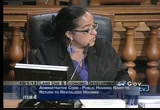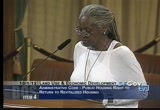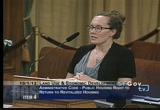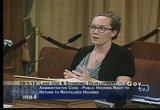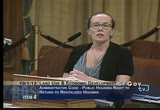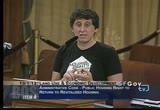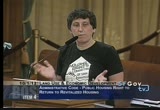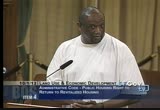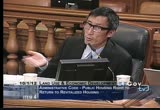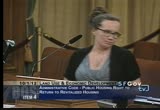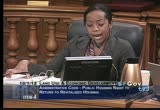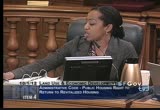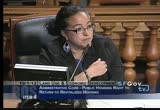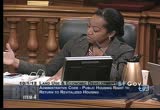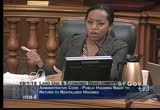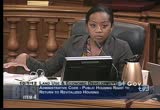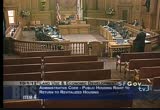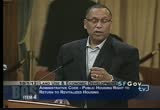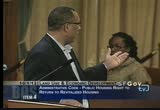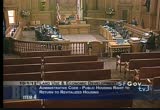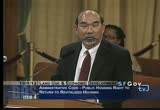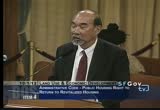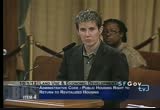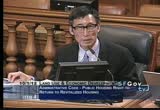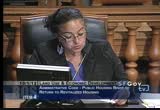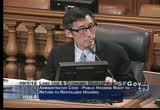tv [untitled] October 17, 2012 2:30am-3:00am PDT
2:30 am
of process. with the legacy of redevelopment and the more recent predications in the stock of public housing as a result of the federal hope 6 program, my district in particular and other districts have experienced its share of permanent displacement of low-income tenants. this displacement has broken positive community bonds, destroyed tight-knit communitis and contributed to african-american out-migration. with this legislation, no longer will san francisco endorse or fund public housing rebuilds that displace residents outside of their communities or out of san francisco. this is the first step of many that this board of supervisors can take to demonstrate that the city has learned lessons from the ills of redevelopment and has intentionally developed a plan to be more conscious of the families fact impacted by redevelopment type of activities. this legislation gives a family that is forced to move a choice in priority to return to the
2:31 am
site where their homes once existed. it also begins to rebuild in addition to housing trust between residents and the developer teams charged with redeveloping the site. the high level concept of this legislation do the following: gives households the right to return provided that they have not been evicted. minimizes screening criteria in order to ensure that residents aren't somehow weed out and restricted from the new housing. income eligibility qualifications not be affected theriors city review of any relocation plans and entires [skphrao-eupbs/] with local beliefs. it also required a non-binding recommendation to be issued to the housing authority commission prior to its adoption of the plan. it designated the rent board as the independence third party that will hear any relocation claim appeals this. was added in order to maintain an unbiased review of the residents' appeals. i am happy to have worked with
2:32 am
the housing rights committee, bay area legal fund, the mays a office of housing, et cetera. i want to thank them for their participation. this legislation is an example of a true public-private and community partnership and i am glad to bring this to the committee today. so i guess i was not aware there was no right to return policy. so that is why we have been working to try to establish something. >> thank you supervisor olague. my understanding is that if mr. givner is determined this is a substantive amendment it has to sit for a week before we take action on item, is that right? >> deputy city attorney, yes. >> so supervisor olague, should we open this up for public comment? >> sure. >> thank you. is there anyone from the public
2:33 am
that would like to speak on this item? so please come forward, up to three minutes. and a buzzer will go off with 30 seconds to go first speaker. >> good afternoon supervisor, my name is patricia thomas. i have been a receipt here for 15 years, public housing and also i'm board member of pu improvement commission. it's an organization established by residents of pu housing development in san francisco's chinatown. we have 413 households living in the development. and they are mostly low-income, limited. english-speaking immigrant families and seniors. for many of us it's been a long time. it took us a long-time to get
2:34 am
to public housing. once we were there, we put down roots. this becomes our home, not just a unit in a building. and the people around us become our family. to be displaced for a revitalization project means leaving our home and family. this is very frightening, especially when there is no ordinance to protect our right of return, once the development work is completed. to further protect us, we should not have to go through additional screening in order to return. the housing authority has already checked and approved our eligibility. it is also not cost efficient to rescreen. not to mention the extra burden it puts on us. this is why myself and i'm sure many others are in support of the right of return proposed ordinance. we need to know that after
2:35 am
being displaced by public housing revitalization projects we have the right to return to enadjacent newly envated facilities ops the work is completed. we truly hope that you agree. thank you. >> thank you. >> public housing often fosters the development of [kph-ufpbt/] community bonds and when people are forced to
2:36 am
leave the community, the bonds are broken and it's tremendously destructive to the community. supervisor olague has already told us previously there was no right to return and i wanted to point out what is now required is that when a public housing development is destroyed and is going to rebuild, what happens is that familis are given vouchers or money in order to relocate. and because of the very high rents in san francisco, what often happens is that the families don't actually have enough money with the voucher or that relocation fund to stay in san francisco. so they are forced to go out of the city completely and then during the time that the building is being rebuilt, they build up a whole new life and their children go to new school and they are never able to go back. so it's trespassly important to many san francisco residents, particularly the african-american community. and this has already been
2:37 am
brought up, but 35% of people in san francisco who live in subsidized housing are african-american. and 20% of african-americans in the city of san francisco reside in public or subsidized housing. so we're talking about a big portion of this community and we're aware we're suffering a real loss in that area and we're losing our african-american population. so the right to return would go a long way towards preventing further loss. >> can i just ask you to repeat the statistics, you said that% of the african-american lives in public housing? >> 20% -- there are -- two numbers, 35% of substance duesed and public housing is african-american and separately, if you look at entire population of san francisco, 20% of the african-americans are in public or subsidized housing. sorry to confuse you. thank you very much. >> thank you. next speaker.
2:38 am
- >> hello again. i'm sarah shourd with housing rights committee. we serve residents of public housing and so we have heard many, many of the stories of the fallout from hope of, which was the hope sf predecessor federal program to revitalization public house. so we're acutely aware of the problems caused by that, where tenants were simply displaced and fell through the cracks due to lack of monitoring. they were given vouchers and therefore, moved to other cities. there simply weren't enough units, so people couldn't come back and due to screening and eligibility requirements, people were left out of the new developed units. and so in light of those stories that we had heard from our clients, we have actually
2:39 am
worked with supervisor olague's office to craft this legislation, because we saw the writing on the wall. with hope sf happening, a program that we do support, because our public housing stock is so severely distressed that we do need to rebuild it and we have no federal funds to continue operating it as it is. and so we wanted to make sure we could have the best of both worlds, which is to have newly developed housing that is habitable for its residents. and also have the residents who currently live there be the beneficiaries essentially of these new, shiny units. and therefore, we thought this was the best possible way to ensure that if people are in good standing, they get back into the new development, period. and that there is 1 one for one replacement, so that all of the folks currently living there
2:40 am
have a place in the new development. where they can go, that is appropriately sized, et cetera. and that there is good monitoring and tracking. so that this time people just don't kind of fall through the cracks and not end up back, sort of for administrative or bureaucratic reasons and the other thing that is important about this legislation that is an added right. is that there is an appeal process that will be setup. as of now, even though there are some federally given relocation rights if they are violated, people have little recourse. , but a lawsuit and what this would do is actually make a very simple process where people can go to the rent board and appeal their case, if they thought their relocation rights were violated. so we wanted to point out that is a very new and important piece that this legislation offers.
2:41 am
>> thank you, next speaker. >> my name is mr. lavell shaw. i support the right to return policy, too. but i also want to make it clear on residents, on the good standing process. because we do not have it clear about what they mean by "good standing." because that could mean various things. to make it clear, so when we make the right to return policy we make it clear on what "good standing" means for the residents? a lot of lo income residents stated as before, african-americans and that is who i represent, the african-american population, the majority and pacific islanders populations. i i think people should know that and san francisco should know we have been driven from our neighborhoods. all of the people in our neighbors are not bad. so we need to have the right to rush policy, return policy, because we want to stay in neighbors
2:42 am
that we were born and raised in and have the same rights as another neighborhoods any other speakers? thank you our mayor owes office of housing and the housing authority as well. thank you for being here. supervisor cohen? >> thank you. so one of the current speakers earlier spoke of having a voucher and being able to return. i assume you are talking about a certificate of preference? >> [ inaudible ] [ inaudible ] >> the voucher i was referring to is under the previous program, what has happened is that tenants are given a
2:43 am
voucher that isn't enough to pay rent in san francisco. so people are forced to find someplace where the rent is cheap enough to use the voucher. so the right to return would be a different system that would provide -- it doesn't specify what kind of housing would be provided in the interim, but what it's specific on is after the new building was completed the tenant would be able to return and live in that building, and wouldn't be forced to relocation completely out of city. >> thank you. one of the things that i find interesting is when people talk about the african-american experience in san francisco and out-migration and one key point i hope to drive home, when we talk about economic development, we also talk about it in context of workforce development. when we talk about our budget situation where we are in the city, we also talk about cuts
2:44 am
by virtue of simultaneously talking about revenue. when we talk about the african-american out-mike migration rarely do we talk about recruitment and retention. when we begin to talk to developers about who they use to market and where they market? that really has a significant impact as to which audience they are actually capturing? now if the city was truly interested in increasing the african-american population, then i would put that the city needs to take the initiative, as well as lead developers. when we are marketing these new rental units on the market, that we are advertising in ebony and essence and jet and
2:45 am
some of the african-american journals, publications and associations, so we're able to capturethis community, this market. you said yourself 25% live in public housing. there is an unbelievable amount of wealth within the african-american community, as well as education. when we look at thriving cities like atlanta, washington, d.c., chicago -- i won't use detroit because that is a different situation. but really my rant does have a point. my point is that we really need to get serious about this outmigration. task forces have said it and there is only so much government can do and we really need to begin to hold our private partners accessible. if you are truly look to recruel talented
2:46 am
african-americans to come and live in this city, to work for our corporations, to establish businesses then we need to go and speak to them where they are. thank you. >> thank you. supervisor olague? >> yes, i just wanted to thank supervisor cohen for her comments. because we don't talk about inmigration enough and then sometimes when we have talked about the local hiring around construction, i wonder how do we make sure some that some of those folks from the community, who have been displaced or who are part of the outmigration, how can they access some of those jobs? so i think there are more conversations that we need to have around that sort of thing, but thank you for your comments. >> thank you. >> i think that my understanding is that this gentleman asked about the who is being excluded from the right to return legislation? i
2:47 am
think the only households that i understand would be excluded would be those who have been evicted. so if you have not been evicted, i think then you could be considered for return to your homes. you know? that is my understanding. >> supervisor cohen. >> thank you very much. this is something that i forget to mention and i'm also a co-sponsor on this, too. as we are less than 90 days with the rebuild of hunters view. we have had zero displacement and we're getting ready within the next 80 plus days to welcome new families into their units. but what mr. shaw was talking about is what exactly does "good standing" mean? so "good standing" and this is for the record, this is where i'm concerned. there is a culture that is sometimes developed in housing where people have been able to get away with not paying their rent. now i understand that we have changed that and we now have
2:48 am
the accounting practices to keep people in -- keep better records. but in that vein people in housing are going through a process, the tenants going through a process it become fiscally healthy and understand how to manage their dollars. yes, there is a code of ethicks that did details in writing what is "good standing," and i'm sensitive to what mr. shaw was saying it's a little nebulous about what exactly. arbitrary and i think the arbitrariness that mr. shaw is concerned about and i am concerned with. the housing authority folks are here. >> if i miss finish, supervisor. sorry about that. >> that is okay. because it's not so much up to the housing authority. >> right. >> because as it relates to
2:49 am
hunters view, the property apartment is going to be relinquished from the housing [tho-rts/] to john stewart. so in that transition, what if any changes will be made to that "standard of good standing?" >> yes. >> that is a little bit unclear and we within the to make sure and ensure had a every resident that is there now and any unit of housing, when the transition happens from the housing authority to the private management company. that no one is lost or as we heard earlier today, falls through the cracks in the midst of that transition. >> thank you. supervisor olague, did you want to ask mr. alvarez? >> again, thank you, mr. alvarez and kyle, i forgot your last flame, for
2:50 am
[tpha*-eufpl/], for name of for all of your assistance. i have heard a lot of concerns around displacement at those sites. so i don't know if you could len to this. >> supervisor, thank you, henry alvarez from the housing authority. i don't know much about marcus gardens. we don't manage those, but in hunters view the notion of right to return and we believe that is an important clarification that and distinction that needs to be made is simply if you are not evicted or being evicted, you will have the right to return. once the buildings are done and reoccupied they will no longer be under the housing authority's management. so the issue becomes simply a
2:51 am
third party manager trying to manage those properties. different from what we do now, because they will be debt-laden. so the resources this they recover from rent will be used to pay their debt payment. and there will be substantial amounts of debt on those properties. whereas in our current public housing facilities, there is no debt that we have to pay. there is just the general maintenance and upkeep is what we typically use our rents for. so on the other side of the aisle, when the third party management takes over, not only must they have enough resources to pay that debt, but they must have enough resources to do the ongoing maintenance and capital improvements. so in those record there's is going -- regards there is going to be significant pressure to collect those rents. so at hope sf,
2:52 am
we're reeducating that planning, and other lifestyle and to answer supervisor cohen as question, i don't imagine that. we continue to have safety net provisions so that if individuals are unable to meet the transformation in these areas about how we would place a safety net to protect those clients. we envision when we're all done and those provisions will be in place and vetted. and i think they will be acceptable this that no one will generally be displaced for their inability to transform into the new moil, which is not the model that we talked about
2:53 am
under hope 6, in fact, san francisco you will be leading the nation with this right to return process and one for one reblame. no one else in the country is doing that. >> it's brilliant. it's good. >> thank you. >> supervisor olague. >> i was wondering director lee if you had anything to add to that? then i was going to ask ann marie rogers to give a report back from the planning commission meeting. >> as director alvarez says, this is leading the nation and this is one of those things, which i call "only in san francisco." i do want to make it clear that hope sf always had the principle of right to return. it was clearly a principle on
2:54 am
when the process of hope sf was built upon and a foundation in which we're moving forward. so we clearly support the legislation. and it really is very, very different than what other communities have done in rebuilding distressed public housing. we're fortunate at hunters view and at alice griffith that we have adjacent parcels and lower density so we can have on-site relocation. so we're not going to lose people from that elocation process, giving them vouchers and moving them anywhere in either the city or across the bay as the [ka-euts/] case the might be. we should be able to contain all the residents in housing and not leaving the site for
2:55 am
temporary relocation as the case may be. the mayor's office supports the amended legislation and look forward seeing you at the opening of hadn'ters view. in the very near future. new families will be moving in prior to thanksgiving, but not quite sure when we'll have the opening event, but it's very different than what the rest of the country is doing. san francisco should be proud had a we're doing that in the manner and we hope to be continuing this work at alice grifth, for which we got a choice neighborhood grant. we look forward to working hopefully at potrero.
2:56 am
>> thank you sahara showered. >> emily rogers from the planning department staff. you are all familiar to how the code are referred for input and you may not beware that other municipal code changes may be referred from the clerks to the department. in this case, the commission heard about this ordinance and they proactively wanted to weigh in. they knew that they had some hope sf entitlements coming before them and wanted to ensure that the city does this right. so i'm looking at the ordinance last week, the commission voted 7-0 to recommend endorsement of the policy for the right to return ordinance. and that is my report. thank you. >> yes, supervisor cohen? so let me just thank everyone for testifying. thank you to supervisors olague and cohen. he did know some of the familis
2:57 am
families from the hope 6 project and i know that did displace a number of folks and i know that hope sf has learned from the past and i would like to be added as a co-sponsor. i know we have an amendment today. we're going to continue the item because of the substantive amendment. supervisor olague. >> i will just go through the amendments. >> you are going to read the amendments for the record and then we'll change them [stkpwh-fplt/] change the current tenant definite to current household and this change is accepted and revised and the intent is to consider all members of a household as one household for the purposes of the right to return. remove the prior tenant's definition. this change is accepted since the right to return would be extended to residents that are
2:58 am
considered by existing law to be displaced temporary or permanently. add the term "comparable to the definition of, "replacement units." this change is accepted and revised in order to mintain consistency with federal law. remove "relocation apeas board," references. this change is accepted in two parts. for the purposes of he relocation plan review, the appeals reference was removed and replaced with "the city funding agency." any project that is funded by a city agency will require that agency to review the relocation plan for compliance with local polices and issue a non-binding advisory statement. all relocation claim appeals will be heard about an administrative law just from the rent stabilization and arbitration board. language was added in order to authorize the board to conduct
2:59 am
hearings. and time change public housing development project definition to "hope sf public housing development project." this change was not accepted. it's the goal of the legislation to provide the right to return to all public housing residents that are being displaced. >> thank you. so if there is no discussion on the amendments, colleagues, can we take those amendments without objection? great, thank you, [ gavel ] >> and can we continue this item until next week, which is our land use committee meeting? it will actually be october 15th, october 8th is a holiday. colleagues can we continue to this our next meeting to october 15th without objection? [ gavel ] . thank you. miss miller, are there necessity other items before us? >> no, there are no further matters. >> thank you everyone. meeting adjourned [
133 Views
IN COLLECTIONS
SFGTV: San Francisco Government Television Television Archive
Television Archive  Television Archive News Search Service
Television Archive News Search Service 
Uploaded by TV Archive on

 Live Music Archive
Live Music Archive Librivox Free Audio
Librivox Free Audio Metropolitan Museum
Metropolitan Museum Cleveland Museum of Art
Cleveland Museum of Art Internet Arcade
Internet Arcade Console Living Room
Console Living Room Books to Borrow
Books to Borrow Open Library
Open Library TV News
TV News Understanding 9/11
Understanding 9/11